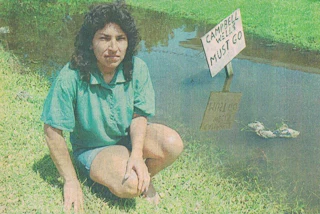

Community Atlas
Grand Bois
The community of Grand Bois is located in Lafourche Parish. The unincorporated town has approximately 300 residents who are of predominantly Native American descent (Times Picayune 1995). This rural community utilized the waterway for food and leisure. But in the 1980s, a waste site was developed adjacent to the community.
In 1994, Exxon moved eighty-one trucks worth of oil-field waste from Alabama to the 140 acre disposal site, Campbell Wells (CBS News 1997). The waste was considered non hazardous due to a federal exemption for certain industrial wastes (New York Times 1998). Testing done by the Louisiana Department of Environmental Quality found high quantities of benzene, hydrogen sulfide, and other chemicals. The waste was processed in open air pits that produced intense fumes (CBS News 1997).
The residents of Grand Bois filed a class action lawsuit against Exxon and Campbell Wells asking for compensation for damages and that the company stop handling waste in a way that could affect residents (Times Picayune 1995). A settlement was reached and various state agencies increased regulations and monitoring of oilfield waste pits (Houma Today 2005).
Though they won the settlement, the lagoons of waste are still open and operational. Residents have been unsatisfied with the response to their complaints and feel that this facility and the waste it stores severely impacts the health of the residents, as well as anyone who travels the highway, on a daily basis (4WWL 2013). The waste site is a 140 acre waste treatment facility that receives millions of barrels of oil field waste including: Produced Waters, Drill Muds, E & P waste, Washout Water, Crude Oil Spill clean-up wastes and other waste. The oil field waste is considered non-hazardous due to a Federal exemption for certain oil and gas production wastes.

